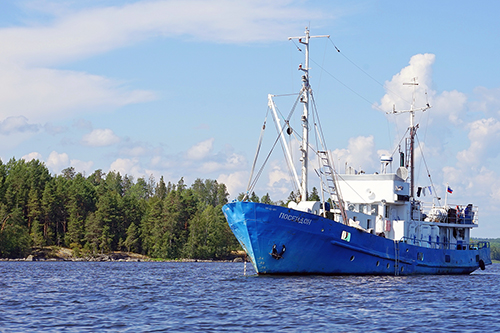The conference is named after the founder of Russian Finno-Ugric studies, Professor, Doctor of Philology, Corresponding Fellow of the USSR Academy of Sciences Dmitry Vladimirovich Bubrikh, who initiated the development of school of thought in Leningrad, Karelia and other Finno-Ugric republics. More than 20 years of the scientist's life were connected with our region and the study of the Karelian language. The material he has collected and his ideas are the basis for the development of Karelian linguistics.
Bubrikh's Readings are traditionally organized by the Institute of Linguistics, Literature and History (ILLH) KarRC RAS and the Institute of Philology of the Petrozavodsk State University. As Irina Novak, Director of the ILLH KarRC RAS, said in her welcoming speech, Dmitry Bubrikh stood at the origins of the Institute of Linguistics, Literature and History KarRC RAS and the Finnish Language and Literature Department of PetrSU, thus laying the foundation for the Baltic-Finnish linguistic science school in the republic.

Irina Novak, Director, Institute of Linguistics, Literature and History KarRC RAS
– For the first time in the history of the conference, presentations could not all fit into two working days. It's the first time that the number of participants from outside Karelia exceeded the number of local speakers. The geography is just stunning! Finno-Ugric scholars from all over the country flocked here; we were joined by all Finno-Ugric republics: Komi, Mari El, Mordovia, Udmurtia, Khanty-Mansi Autonomous Okrug of Yugra, as well as by Moscow, St. Petersburg, Krasnoyarsk, Yekaterinburg, Kazan, Yakutsk, Tver, Murmansk, Kolomna, – told Irina Novak.
The Institute's leader is confident that this year's conference will be a landmark event: “The conference title also speaks for itself: “Traditions and Novelties”. They are not opposed, but go in parallel, complementing and strengthening each other. We realize that no novelties are possible without a solid ground prepared by previous generations. And at the same time, we can no longer imagine the development of traditional branches without the use of digital technologies.

Speaking: Director of the Institute of Philology PetrSU Oksana Abramova
Director of the PetrSU Institute of Philology Oksana Abramova, in turn, emphasized that it's already the 20th Bubrikh's Readings.
– It's a substantial period of time, which obliges us to look back and evaluate what has been done over this time, how the conference, which has become one of the most important discussion platforms for researchers of the Balto-Finnic domain, has influenced our scientific, educational, project relations, the development of specific scientific topics, youth involvement in science, - said Oksana Abramova, welcoming the participants.
The conference program includes plenary sessions, thematic sesions “The faces of the history of Finno-Ugric studies”, “Finno-Ugric language studies: from tradition to novelties”, “Problems of linguistic nomination”, “History and culture of Finno-Ugric peoples: study, preservation and representation”, “Literary and folklore studies”, roundtable “Languages in a polylingual space: practices, strategies, solutions” and the youth school named after D. V. Bubrich “Issues of functioning of Finno-Ugric languages and cultures” for early-career researchers, master's and doctoral students.








